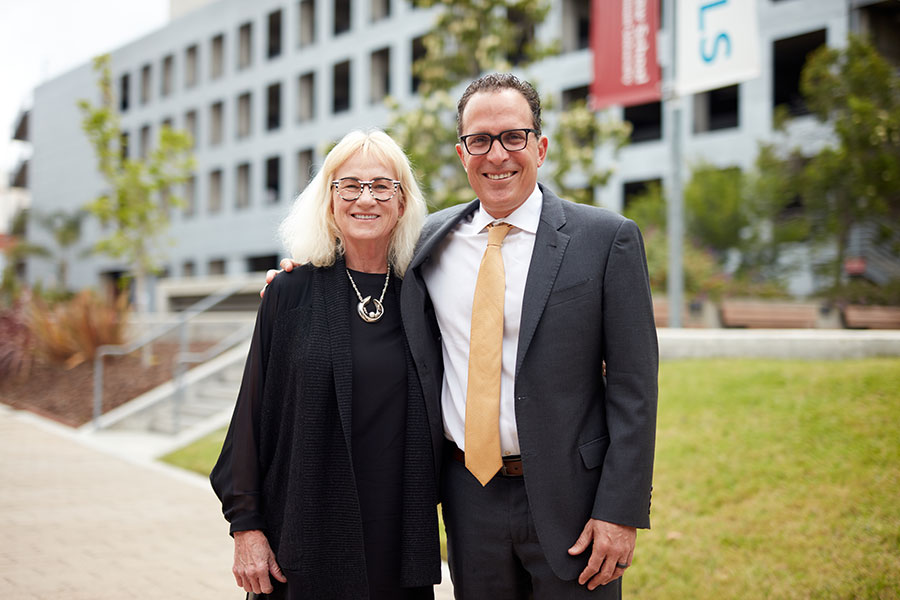
“I want happy law students.” It comes as no surprise to hear these words spoken by Therese Maynard, professor and founder of the Transactional Lawyering Institute at LMU Loyola Law School. For Maynard, the feeling of well-being that arises from personal fulfillment and the pursuit of the greater good is integral to academic and professional success. Her pedagogy is the product of her personal values, aligned with the shared mission of LLS: to educate leaders in the legal profession and society, committed to the highest standards of integrity, professional ethics, and a deep concern for social justice.
In the words of LLS Dean Michael Waterstone, Maynard is, quite simply, “a legend.” For more than three decades, she has shaped the lives and careers of generations of LLS students, and now her influence will be celebrated in perpetuity by the Therese Maynard Chair in Business Law; the first endowed chair at LLS to be named in honor of a woman. The chair was made possible by one of Maynard’s former students, Marty Willhite ’97. He and his family have given $3.5 million to establish the new faculty position, which will enable LLS to recruit and retain an outstanding scholar and teacher specializing in transactional business law. “I cannot overstate how much Professor Maynard and Loyola Law School mean to me,” said Willhite, gratefully acknowledging Maynard’s profound impact as a mentor, a friend, and an exemplar of intellectual rigor.
Maynard has already played an important role in advancing the university’s reputation as a center for the study of transactional business law; she is also an influential national figure whose approach to experiential learning has been adopted as common practice at law schools across the United States. At a time when LLS was recognized primarily for its focus on litigation and its renowned Trial Advocacy Program, Maynard campaigned for a comparable experiential approach to teaching transactional business law. Her two most prominent books, “Mergers and Acquisitions: Cases, Materials and Problems” and “Business Planning: Financing the Start-Up and Venture Capital Financing” (co-authored with Shannon Trevino), place an unprecedented emphasis on problem solving, public policy, and practical skills to prepare students for professional life; the two texts are now staples of nationwide business law curricula. The Transactional Lawyering Institute, likewise, is designed to provide students with access to practical training and direct feedback that would otherwise require years of professional experience.
The goal is to equip students with a toolkit that will allow them to add value from their first day working as a corporate lawyer – all the more necessary at a time of rapid change, when law, business, and technology are converging in new and exciting ways. “The lawyers we produce need to be versed in both legal and business concepts, growing their judgment and experience while they are still in law school,” said Waterstone. “This gift to establish the new chair, combined with our existing strengths and location in one of the most diverse and entrepreneurial cities on the planet, will allow us to be both creative and nimble moving forward.”
That entrepreneurial foresight is characteristic of Maynard’s own approach to academia. When she started researching the relationship between law and venture capital, it was a comparatively unknown field of study in law schools. The same was true when she founded the Transactional Lawyering Institute, one of the first initiatives of its kind for students. “When we were fundraising for the project, I had to explain – yes, I know that something like this doesn’t exist,” said Maynard. “But, if you build it, they will come.”
Some areas of the law, however, have been more resistant to change. In a profession still weighted in favor of men, the significance of a chair named in honor of a woman should not be underestimated. For Maynard, the chair is an opportunity to further advance the university’s commitment to diverse representation and community service. “The gift will allow us to align transactional learning with the core of the LLS mission, which is social justice,” said Maynard. “I plan to continue teaching at LLS for the foreseeable future, and in the coming months I will have the unusual honor of helping to recruit the new faculty member who will hold the chair bearing my name. Personally, I would like to see the position filled by someone who is committed to empowering entrepreneurs from under-resourced groups – providing access to the capital and the tools they need to generate wealth for their communities.”
The leadership of future chairholders will ensure that Maynard’s legacy of compassion and academic excellence will inform the LLS experience for years to come. Furthermore, the endowment distribution will support innovative research and teaching initiatives in transactional business law at LLS, providing students with the best possible foundation for their future careers. “The essence of a good lawyer is the instinct to solve problems and the desire to help others,” said Maynard. “When I consider what it takes to be a true professional – it’s the continually renewed commitment to go out and make the world a better place.”
To learn more about supporting Loyola Law School, contact Melissa Bersofsky, executive director of development, at melissa.bersofsky@lmu.edu, 310.568.7146, and you can give directly to the LLS Transactional Lawyering Institute here.



